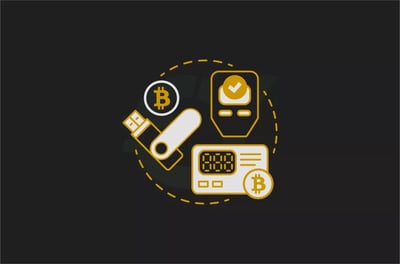Table Of Contents
- Best Ways to Secure your Cryptocurrencies
- 1. Use a cold wallet
- 2. Use a secure internet connection
- 3. Keep multiple wallets
- 4. Strengthen your device safety
- 5. Update your password regularly
- 6. Be aware of phishing
- 7. Be careful of entrusting wallets to others
- 8. Backup your wallet
- 9. Update your software
- 10. Use a multi-signature wallet
- Conclusion
How to Keep Your Crypto Secure? 10 Tips to Secure Crypto Wallets
As a crypto trader, I keep up with the news. It's hard to ignore the fact that the number of publicized hacking and fraud events in the crypto world has continued to increase in recent years, and losses have grown significantly. According to industry and law enforcement data, investors and consumers lost roughly $2.5 billion to cryptocurrency scams and hacks in just the first half of 2025, including major incidents such as the $1.5 billion Bybit exchange hack and other high-profile thefts.
Meanwhile, Federal Trade Commission figures from earlier years show that since the start of 2021, more than 46,000 people reported losing over $1 billion in crypto to scams, accounting for roughly one out of every four dollars lost to fraud paid with digital assets. The median individual reported loss was previously reported at around $2,600, though more recent data suggest median losses in certain scam categories have risen even higher. These trends indicate that not only are crypto scams common, but they also continue to inflict large cumulative losses, with Bitcoin ATM and related fraud surging, including at least $333 million lost to ATM fraud in 2025 alone.
In this light, I've produced this short article to help you better understand how to keep your cryptocurrencies secure. Given the excitement around cryptocurrencies, many new traders have leaped into the unknown and fallen for common crypto scams. Without knowing how to keep their investments secure, they have lost good money, as the FTC’s records show. Whether your crypto wallet contains modest sums, or if it contains vast wealth, as many traders’ wallets do, it is in your interests to keep safety top of mind. What follows is a list of the 10 best ways you can protect your valuable crypto investments.
Cold wallets offer the highest level of crypto security by storing your private keys offline and away from internet threats.
Avoid using public Wi-Fi for trading and consider a VPN to protect your connection when managing your crypto assets.
Splitting your funds across multiple wallets lowers the risk of losing everything in a single attack or device failure.
Keep all devices protected with up-to-date antivirus software, and don't forget that mobile phones are just as vulnerable as laptops.
Strong passwords that are changed regularly can stop brute force attacks and prevent unauthorized access to your wallets.
Be alert to phishing attempts that mimic real crypto platforms and always double-check URLs before entering personal information.
Non-custodial wallets give you full control but also require you to manage backups and safeguard access keys independently.
Using multi-signature wallets adds an extra layer of protection by requiring multiple approvals before funds can be moved.

Best Ways to Secure your Cryptocurrencies
1. Use a cold wallet
I hear a lot of people ask "what is a crypto wallet in the first place?" A crypto wallet is an online or offline storage facility that acts like a physical wallet, except it keeps the private keys to your cryptocurrencies safe. A crypto key is a very long number that is used in cryptography. It acts like a password. The bottom line is that whoever is in possession of the keys is in possession of the crypto coins.
For obvious reasons, private keys must be stored safely. Hot wallets are crypto wallets that are connected to the internet, but these are subject to hacking. In 2022, crypto exchange FTX was hacked shortly after filing for bankruptcy, resulting in the theft of more than $470 million in cryptocurrency from customer accounts.
Cold wallets are not connected to the Internet and are, therefore, less likely to be compromised. Cold wallets come in a USB-like device that you can store securely, for example, in a safe. Cold wallets are also known as offline or hardware wallets. Using a cold wallet is one of the safest ways to store your private keys.
2. Use a secure internet connection
I would recommend to all new crypto traders to never make the mistake of processing crypto transactions over an Internet connection that is not safe. Thankfully, the average person knows better than to make sensitive financial transactions over an unsafe network in an internet café. The same applies to crypto investing. Public Wi-Fi networks are not safe and can often be exploited by threat actors to gain access to crypto private keys and crypto exchange passwords. Even if your crypto investments are on a bear run and you must urgently place an order, resist the urge to use public connections.
Sometimes, traders make use of office or school Internet connections. After all, most crypto traders pursue their crypto trading careers while working full-time or studying. Although most organizations like these have firewalls and antivirus protection, these measures may not meet the required security standard and could still expose you. It is best practice to use a VPN for additional security.
3. Keep multiple wallets
Just as you must diversify your investments in general, the same goes for keeping your cryptos safe. Keeping your private keys stored on multiple wallets significantly reduces your chances of suffering a catastrophic loss. It is much more likely for only one of your wallets to be compromised rather than all of them. It is good advice to use more than one cold wallet for long-term storage and at least one hot wallet with significantly fewer funds for regular daily transactions.
4. Strengthen your device safety
Crypto traders can just as easily work from their mobile phones, laptops, or desktops. This variety of devices is what makes trading in today’s world so convenient. However, the downside is that it leaves you exposed to cyberattacks. Many people go to the trouble of securing laptops and desktops, but fewer people remember to secure their mobile phones. You should always install antivirus software with the newest virus definitions to protect you from newly discovered vulnerabilities.
5. Update your password regularly
In this modern age, password management is an important practice. Be sure to implement only the toughest and most complicated passwords possible. Also, change your password regularly. With increasingly powerful password-hacking software, it is becoming easier for cyber criminals to steal passwords. Think of your crypto wallet in the same way as you would your Internet banking password. You would not use a password that is easy to guess for your mobile banking app, so you should apply the same importance to your crypto wallet or crypto exchange password.
6. Be aware of phishing
Phishing scams are on the rise, as mentioned repeatedly by the FTC and other financial watchdogs. Phishing is when malicious advertisements and emails entice you to click on a link that exposes you to theft. Spear-phishing is when criminals go one step further and use fake domains impersonating known contacts with which you have had dealings to get you to click malicious links.
In what is now a popular scam in the crypto world and in online trading in general, criminals engineer fake Websites that look like real crypto exchanges but are actually trojan horses designed to steal account information. You should always double-check the Web address before you log into your account or enter any of your details.
7. Be careful of entrusting wallets to others
Care should be taken when you decide to entrust your crypto wallet to someone else. Some providers offer to take the hassle out of keeping your private keys safe by giving you the option to entrust your wallet to them. This is known as a custodial wallet. It is the opposite of a non-custodial wallet, which is when you oversee keeping your own wallet.
Custodial wallets give you the benefit of having less responsibility for safeguarding your valuable keys, but it is thought to be much more dangerous because you are placing your private keys in the hands of a third party. Granted, this is often a trusted crypto exchange, but even they can be hacked, and since no crypto exchange is currently compelled to compensate you for lost funds, you are placing yourself at risk. With a non-custodial wallet, you have total control of your private keys and your funds. Some people feel safer with this type of wallet, which can be browser-based or hardware-based.
8. Backup your wallet
You should get into the habit of performing backups of your crypto wallet as often as you can. If you lose your trading device but you have a trail of regular backups, this may be the only way to recover your currency from a digital wallet. If you lose your private keys, you lose your funds. It is that simple. Depending on the security settings of the wallet, if you unsuccessfully try to guess the signatures, the crypto wallet will lock itself and encrypt its content entirely.
9. Update your software
I wasn't very good at this in the beginning, but I now know that anyone with a digital signature should know to keep their software up to date. With crypto, a wallet running on old software can be an easy target for cybercriminals. Each iteration of wallet software contains improved security against known weaknesses. It may be a pain to remember to do this, especially during the thrill of trading, but it is one of the best ways to keep your assets safe and is housekeeping you must carry out as part of your crypto trading risk management and trading strategy.
10. Use a multi-signature wallet
Multi-signature wallets are gaining popularity. They require the approval of a few people before a wallet can be opened. Multi-signature wallets require at least two signatures and can be configured to support as many as you need to feel secure. It may be a cumbersome way to access your crypto assets, yet it could save you in the long run.
Recommended Brokers
Conclusion
It would be an understatement on my part to say that cryptocurrency trading has become ever more popular. The truth is that is has taken off like wildfire. Unfortunately, the large number of new entrants into the marketplace means there is often room for criminals to take advantage of the uninformed. Be sure to adopt as many of the steps we have mentioned as possible to secure your crypto assets and make sure your trading journey continues on a smooth path. You may even have more of the most frequently asked crypto questions, and reading articles like this one can only arm you with more defensive information.






